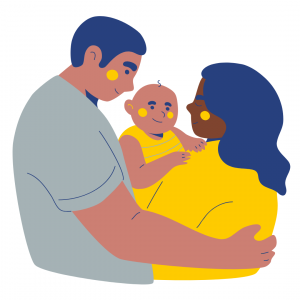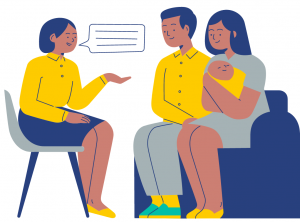With so many physical, hormonal and emotional changes, the mental health of new parents can often be affected. It’s important to know that you’re not alone and there is amazing support within the health service. Dr Edith Agius specialises in perinatal mental health and currently works at the Mosta community health clinic and perinatal mental health clinic at Mater Dei. She spoke with us about the common issues that can arise for new parents and how to identify them.
What are perinatal mental health issues?
A perinatal mental health issue is one that you experience any time from becoming pregnant up to a year after you give birth. Having a baby is a big life event. It’s natural to experience a range of emotions during pregnancy and after giving birth. But if any difficult feelings start to have a big effect on your day-to-day life, you might be experiencing a perinatal mental health issue. This may be new mental health problem, or the recurrence of an issue you’ve experienced in the past.

What causes perinatal mental health issues?
There are many reasons that you might develop a mental health issue. Usually it is the result of a combination of factors.
These factors might include:
- Previous experience of mental health problems
- Biological causes
- Lack of support
- Difficult childhood experiences
- Experience of abuse
- Low self-esteem
- Stressful living conditions
- Major life events
- Complications during labour
How common are perinatal mental health issues?
About 1 in 5 women will experience a perinatal mental health problem. Depression and anxiety disorders (such as generalised anxiety, social anxiety, obsessive-compulsive and post-traumatic stress disorders) are the most frequent, occurring in around 15% of women in the perinatal period. Postpartum psychosis is less common, affecting one to two out of every 1,000 women who give birth.
What is the impact of perinatal mental health issues?
Mental health issues during pregnancy can have a harmful impact not only on the woman but also on the unborn or developing baby, and wider society. Seeking help early is very important as this may improve outcomes for the woman and minimise the negative impacts on the unborn or developing child.
What’s the difference between the ‘baby blues’ and postnatal depression?
The ‘baby blues’ is a brief period of low mood, feeling emotional and tearful around three to 10 days after you give birth. You are likely to be coping with lots of new demands and getting little sleep, so it is natural to feel emotional and overwhelmed. This feeling usually only lasts for a few days and is generally quite manageable.
Postnatal depression is a much deeper and longer-term depression. This usually develops within six weeks of giving birth and it can be gradual or sudden. It can range from being mild to very severe.

If you have perinatal depression, you might feel:
- Down, upset or tearful
- Restless, agitated or irritable
- Guilty and worthless
- Empty and numb
- Isolated and unable to relate to other people
- Unable to find pleasure in life or things you usually enjoy
- A sense of unreality
- A lack of self-confidence or self-esteem
- Hopeless and despairing
- Hostile or indifferent to your partner
- Hostile or indifferent to your baby
- Suicidal feelings
You might find that you:
- Lose concentration easily
- Find it hard to sleep, even when you have the chance
- Have a reduced appetite
- Lack interest in sex
What is perinatal anxiety?
Lots of people are aware that you can become depressed after having a baby. But many people also experience anxiety during pregnancy and after giving birth. In fact, it is common to experience depression and anxiety together.
The common effects of perinatal anxiety on your body include:
- A churning feeling in your stomach
- Feeling light-headed or dizzy
- Pins and needles
- Feeling restless or unable to sit still
- Headaches, backache or other aches and pains
- Faster breathing
- A fast, thumping or irregular heartbeat
- Sweating or hot flushes
- Finding it hard to sleep, even when you have the chance
- Grinding your teeth, especially at night
- Nausea (feeling sick)
- Needing the toilet more or less often
- Changes in your sex drive
- Having panic attacks.
The common effects of perinatal anxiety on your mind include:
- Feeling tense, nervous or unable to relax
- Having a sense of dread, or fearing the worst
- Feeling like the world is speeding up or slowing down
- Feeling like other people can see you’re anxious and are looking at you
- Feeling like you can’t stop worrying, or that bad things will happen if you stop worrying
- Worrying about anxiety itself, for example worrying about when panic attacks might happen
- Wanting lots of reassurance from other people or worrying that people are angry or upset with you
- Worrying that you’re losing touch with reality
- Worrying a lot about things that might happen in the future
- Ruminations – thinking a lot about bad experiences, or thinking over a situation again and again
- Depersonalisation – feeling disconnected from your mind or body, or like you’re watching someone else
- Derealisation – feeling disconnected from the world around you, or like the world isn’t real
What support and services are there?

There are various local organisations, support services and health professionals who can support your mental health during pregnancy and after having a baby.
These include:
- Your GP
- Your Midwife or Obstetrician
- The Perinatal Mental Health Clinic at Mater Dei Hospital
- Community Mental Health Clinics
- Psychiatric Emergency Service at Mater Dei Hospital
Perinatal mental health issues arise in many new parents, it’s important that you connect with yourself often to gauge how you’re feeling. If something doesn’t feel right, there is no shame in seeking help. These amazing services are here for you, and you are most definitely not alone.
Check out Mater Dei’s perinatal mental health leaflet here. You can also call them on 2545 7410 or 7970 1767.



